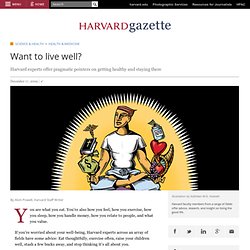

Want to live well? You are what you eat.

You’re also how you feel, how you exercise, how you sleep, how you handle money, how you relate to people, and what you value. If you’re worried about your well-being, Harvard experts across an array of fields have some advice: Eat thoughtfully, exercise often, raise your children well, stash a few bucks away, and stop thinking it’s all about you. People make choices every day that affect their health and happiness, but life’s complexity and its bewildering array of options — not to mention the species-wide lack of willpower — can make living well a challenge.
Vast research conducted across Harvard’s myriad Schools and programs continues to help push back the boundaries of understanding about human health and behavior, enhancing the knowledge of what makes people ill and what makes them well, what makes them wilt and what makes them prosper.
BRAIN. DEMOCRACY. THE most striking thing about the founders of modern democracy such as James Madison and John Stuart Mill is how hard-headed they were.

They regarded democracy as a powerful but imperfect mechanism: something that needed to be designed carefully, in order to harness human creativity but also to check human perversity, and then kept in good working order, constantly oiled, adjusted and worked upon. The need for hard-headedness is particularly pressing when establishing a nascent democracy. One reason why so many democratic experiments have failed recently is that they put too much emphasis on elections and too little on the other essential features of democracy. The power of the state needs to be checked, for instance, and individual rights such as freedom of speech and freedom to organise must be guaranteed.